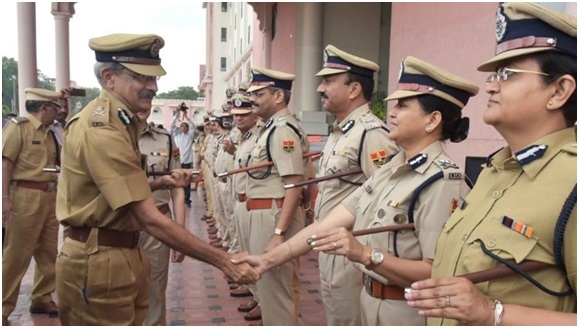India is in Dire need of Police Reforms (LiveMint)

- 03 Aug 2023
Why in the News?
The outbreak of communal violence in the Delhi region raises concerns over the role of law enforcement; police forces need structural autonomy and revised incentives.
About Police and Policing Framework in India:
Police forces play a crucial role in upholding and enforcing laws, investigating crimes, and providing security to the nation's people. Given India's large population, well-equipped police forces with adequate personnel, weaponry, forensic, communication, and transport support are essential for effective performance.
The existing legal and institutional framework for police matters in India was inherited from the British, but it lacks accountability in establishing a responsible police force. Despite multiple reform proposals acknowledged by the Government of India and the Supreme Court, comprehensive implementation remains elusive. Consequently, India must revise the legal and institutional framework to advance towards smart policing.
Constitutional and Legal Provisions:
- As per the Constitution of India, 'Police' and 'Public Order' fall under state subjects in the Seventh Schedule, granting each state its own police force.
- The central government is also permitted to maintain its police forces to assist states in maintaining law and order.
- The foundational framework for policing in India was established through the Police Act, of 1861, during the pre-independence era.
- Additionally, several other laws and regulations, such as the Criminal Procedure Code (CrPC), Indian Penal Code (IPC), Evidence Act, and state-specific laws, govern the functioning of the police in India.
Issues and challenges in Police Forces:
- Colonial Legacy: The current police system in India is still rooted in colonial-era laws, with past misuse of police as a tool to suppress dissent, which sometimes continues in the present government.
- Shortage of Police Personnel: Despite a sanctioned strength of 181 police per lakh persons in 2016, the actual strength was only 137 police, well below the United Nations' recommended standard of 222 police per lakh persons, leading to overburdened police personnel.
- Custodial Death: Instances of custodial death due to torture or pressure in police/judicial custody remain a concern, despite the Supreme Court's guidelines against it.
- Inadequate Infrastructure: Modern policing requires robust communication support, modern weapons, and high mobility, but funds allocated for police infrastructure often face underutilization.
- Lack of Torture Law: While India has signed the "United Nations Convention Against Torture," a specific domestic law against torture is yet to be enacted.
- Political Interference: Political interference hampers police officers' ability to perform their duties effectively, with insufficient tenure and posting security for higher-ranking officers.
- Promotion and Working Conditions: Qualifications and training for police personnel, especially at lower levels, need improvement. Verbal abuse from superiors and inhumane working conditions for lower ranks impact their relationship with the public negatively.
Significance of Police Reforms:
- Police-Population Ratio: India's low ratio of 120 police per 100,000 people, compared to the global average of 270, results in inadequately equipped and politically oriented police, posing a security challenge for its citizens.
- Tackling Corruption: A significant rise in vigilance inquiries against police personnel in 2016 and a decrease in corruption from 66% (2014) to 34% (2015) highlight the need for reforms to address corruption within the police force.
- Adapting to Changing Crime Patterns: Evolving social and technological changes, driven by the internet and social media, have transformed crime, necessitating reforms to effectively combat lawlessness and global terrorism.
- Ensuring Inclusivity: Underrepresentation of women and marginalized castes can lead to insensitivity towards these groups, highlighting the importance of reforms to promote inclusivity within the police force.
- Addressing Caste-Based Violence: Reforms are crucial to tackling escalating violence arising from caste conflicts, including recent Dalit uprisings and farmers' issues across the country.
Various Committees for Police Reforms:
- Gore Committee on Police Training (1971-73): Reviewed police training from constabulary to IPS officers.
- National Police Commission (1977): Produced eight Reports on various aspects of police administration.
- Ribeiro Committee (1998): Recommended setting up Police Performance and Accountability Commissions at the state level and a District Complaints Authority, and replacing the Police Act, of 1861.
- Padmanabhaiah Committee (2000): Studied police force recruitment, training, duties, investigations, and prosecution.
- Soli Sorabjee Committee (2005).
- Vohra Committee Report: Exposed the nexus between criminals, politicians, and government officials, suggesting the establishment of an institution to address the issue.
Way Forward for Police Reforms: Seven Supreme Court Directives
- Curbing Political Control: Ensure state governments do not exert undue influence or pressure on the police.
- Merit-Based Appointments: Implement a transparent and merit-based process for appointing the Director-General of Police, ensuring a minimum tenure of 2 years.
- Tenure Stability: Provide a minimum tenure of 2 years to police officers handling operational duties, including district Superintendents of Police and Station House Officers.
- Separation of Functions: Separate the roles of investigation and law enforcement to enhance efficiency and transparency.
- Police Establishment Board: Establish a Police Establishment Board to address transfers, postings, promotions, and service-related matters for officers up to the rank of Deputy Superintendent of Police.
- State and District Police Complaints Authority: Set up independent Police Complaints Authorities at the state and district levels to address serious misconduct complaints against police officers.
- National Security Commission: Establish a National Security Commission at the union level to facilitate the selection and placement of chiefs of Central Police Organizations with a minimum tenure of 2 years.
